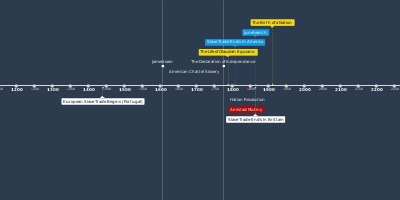30 март 1965 г. - Voting Rights Act of 1965
Описание:
A landmark piece of federal legislation in the United States that prohibits racial discrimination in voting. It was signed into law by United States President Lyndon B. Johnson during the height of the civil rights movement on August 6, 1965, and Congress later amended the Act five times to expand its protections. Designed to enforce the voting rights guaranteed by the Fourteenth and Fifteenth Amendments to the United States Constitution, the Act secured the right to vote for racial minorities throughout the country, especially in the South.As initially ratified, the United States Constitution granted each state complete discretion to determine voter qualifications for its residents. After the Civil War, the three Reconstruction Amendments were ratified and limited this discretion and empowered Congress to enforce their provisions through "appropriate legislation".
To enforce the Reconstruction Amendments, Congress passed the Enforcement Acts in the 1870s. The Acts criminalized the obstruction of a citizen's voting rights and provided for federal supervision of the electoral process, including voter registration.[16]:310 However, in 1875 the Supreme Court struck down parts of the legislation as unconstitutional in United States v. Cruikshank and United States v. Reese. After the Reconstruction Era ended in 1877, enforcement of these laws became erratic, and in 1894, Congress repealed most of their provisions.
Southern states generally sought to disenfranchise racial minorities during and after Reconstruction. From 1868 to 1888, electoral fraud and violence throughout the South suppressed the African-American vote. From 1888 to 1908, Southern states legalized disenfranchisement by enacting Jim Crow laws; they amended their constitutions and passed legislation to impose various voting restrictions, including literacy tests, poll taxes, property-ownership requirements, moral character tests, requirements that voter registration applicants interpret particular documents, and grandfather clauses that allowed otherwise-ineligible persons to vote if their grandfathers voted (which excluded many African Americans whose grandfathers had been slaves or otherwise ineligible). During this period, the Supreme Court generally upheld efforts to discriminate against racial minorities.
In the 1950s, the Civil Rights Movement increased pressure on the federal government to protect the voting rights of racial minorities. In 1957, Congress passed the first civil rights legislation since Reconstruction: the Civil Rights Act of 1957. This legislation authorized the Attorney General to sue for injunctive relief on behalf of persons whose Fifteenth Amendment rights were denied, created the Civil Rights Division within the Department of Justice to enforce civil rights through litigation, and created the Commission on Civil Rights to investigate voting rights deprivations. Further protections were enacted in the Civil Rights Act of 1960, which allowed federal courts to appoint referees to conduct voter registration in jurisdictions that engaged in voting discrimination against racial minorities.
Although these acts helped empower courts to remedy violations of federal voting rights, strict legal standards made it difficult for the Department of Justice to successfully pursue litigation. For example, to win a discrimination lawsuit against a state that maintained a literacy test, the Department needed to prove that the rejected voter-registration applications of racial minorities were comparable to the accepted applications of whites. This involved comparing thousands of applications in each of the state's counties in a process that could last months. The Department's efforts were further hampered by resistance from local election officials, who would claim to have misplaced the voter registration records of racial minorities, remove registered racial minorities from the electoral rolls, and resign so that voter registration ceased. Moreover, the Department often needed to appeal lawsuits several times before the judiciary provided relief because many federal district court judges opposed racial minority suffrage. Thus, between 1957 and 1964, the African-American voter registration rate in the South increased only marginally even though the Department litigated 71 voting rights lawsuits.
Congress responded to rampant discrimination against racial minorities in public accommodations and government services by passing the Civil Rights Act of 1964. The Act included some voting rights protections; it required registrars to equally administer literacy tests in writing to each voter and to accept applications that contained minor errors, and it created a rebuttable presumption that persons with a sixth-grade education were sufficiently literate to vote. However, despite lobbying from civil rights leaders, the Act did not prohibit most forms of voting discrimination. President Lyndon B. Johnson recognized this, and shortly after the 1964 elections in which Democrats gained overwhelming majorities in both chambers of Congress, he privately instructed Attorney General Nicholas Katzenbach to draft "the goddamndest, toughest voting rights act that you can".
President Johnson, addressing a televised joint session of Congress on March 15, called on legislators to enact expansive voting rights legislation. He concluded his speech with the words "we shall overcome", a major anthem of the Civil Rights Movement. The Voting Rights Act of 1965 was introduced in Congress two days later while civil rights leaders, now under the protection of federal troops, led a march of 25,000 people from Selma to Montgomery.
After its enactment in 1965, the law immediately decreased racial discrimination in voting. The suspension of literacy tests and the assignments of federal examiners and observers allowed for high numbers of racial minorities to register to vote. Nearly 250,000 African Americans registered in 1965, one-third of whom were registered by federal examiners. In covered jurisdictions, less than one-third (29.3%) of the African American population was registered in 1965; by 1967, this number increased to more than half (52.1%), and a majority of African American residents became registered to vote in 9 of the 13 Southern states. Similar increases were seen in the number of African Americans elected to office: between 1965 and 1985, African Americans elected as state legislators in the 11 former Confederate states increased from 3 to 176. Nationwide, the number of African American elected officials increased from 1,469 in 1970 to 4,912 in 1980. By 2011, the number was approximately 10,500.
Добавлено на ленту времени:
Дата:
30 март 1965 г.
Сейчас
~ 60 г назад
